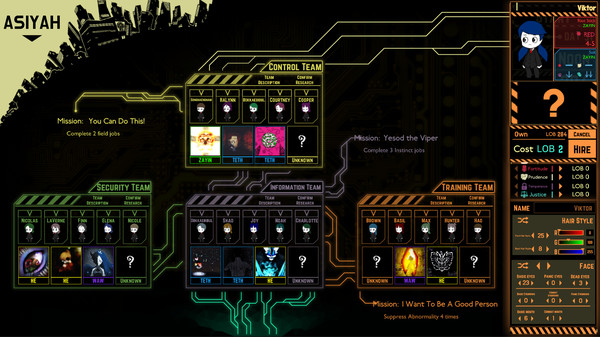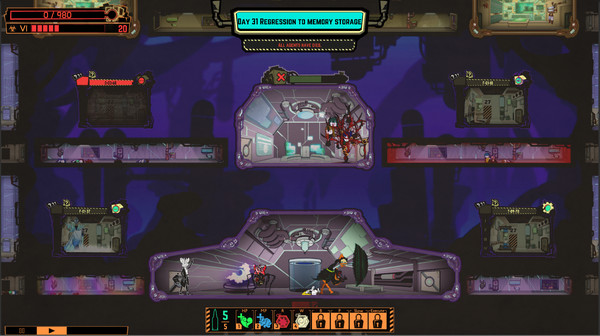Lobotomy Corporation isn’t just a game - It’s a mental construct designed to break your spirit in slow, calculated increments. It presents itself with a clean interface, some snappy corporate lingo, and an intriguing promise: “Face the fear, build the future.” But what it actually delivers is a psychological meat grinder wrapped in a twisted office simulator. The further you get into it, the more you realize it’s not just challenging, it’s really personal, the amount of mental breakdowns this game causes over a stupid lost employee that takes away lots of progress and potential luck. From the outside, Lobotomy Corporation has the look of a quirky indie game with mysterious monsters and weird SCP-like flavor. You’re the manager. You make decisions. You run a corporation. But the reality is more sinister. This isn’t about progress. It’s about control. Or more specifically, the illusion of it. You find out you're being manipulated but you just shrug it off. This game was made in the deepest pit of hell. You don’t play Lobotomy Corporation as much as submit to it. The UI is sterile and mechanical. The music loops calmly as if nothing horrific is happening. The serenity of the interface versus the chaos it conceals is maddening. It’s a spreadsheet hell with horror lurking behind every box and dropdown menu. Every time you hear the light bells you get a shudder of terror and trauma. But the most punishing part isn’t even the difficulty. It’s the restarts. Restarting in Lobotomy Corporation is an emotional event. Not because you lost. failure isn’t loud or dramatic, It’s slow. Quiet. Creeping. You gradually realize that things have gone wrong beyond recovery and then you’re faced with a cold truth: you have to go back, restart it all. Yes, you have your EGO, but at what cost? Back to the title screen. Back to watching the same conversations, the same dialogue boxes, the same menus pretending they’re offering you choice. But you know better now: your “choices” are just new paths to different types of failure. You begin again, not because you want to, but because you have no other option. Each restart feels heavier than the last. The game doesn’t care how many hours you put in. It barely cares what you learned. It strips you of progress like it’s a punishment. Maybe that’s the real design, an experiment not in gameplay, but in endurance. The game is opaque by design. It feeds on your curiosity. You want to know more about the abnormalities. About the facility. About that damn ai. You convince yourself that the suffering is worth it. But eventually, something changes. You don’t look forward to progress, you fear it. You dread unlocking something new because it means more rules, more pain, more systems layered on top of the ones you still barely just learned. You move through menus like a ghost. You no longer ragequit, you just restart again. Because that's what Lobotomy Corporation does best, it rewires your tolerance for frustration. It trains you to accept suffering as part of the process. It slowly bleeds your motivation until you’re not even playing for fun anymore. You’re playing because you have to finish this. Restarting in Lobotomy Corporation is not a failure state, it's a ritual. A reset of your expectations. A moment to realize that what you learned doesn’t matter. This is not a game that teaches you to overcome. It teaches you to endure. But if the constant restarting is the erosion of your will, the combat is the jagged edge that slices through whatever resolve you have left. Combat isn’t designed to be “fun.” It’s not cinematic or reactive. You watch tiny people fight horrors not with strategy, but with hope. You assign them like a manager signing a death warrant. When agents die, they don’t scream. They brutally explode. Like data being deleted. And maybe that’s worse. Then there are the Abnormalities that don’t just kill you, they humiliate you. Some combat encounters aren’t about strength. They’re about absurd, almost puzzle-like mechanics. You walk into a fight only to watch half your team melt, explode, go insane, or turn on the others. All because you didn't spend 6 points to read another document. No fight is fair. No breach is manageable unless you’ve already seen it before and memorized it. Even then, the game stacks the odds. A weak agent’s panic can trigger a chain reaction. One breach leads to another. Panic spreads. Clerks die. And all you can do is watch the spiral unfold. Combat feels like solving a Rubik’s Cube while it’s on fire and someone’s deleting the instructions in real time. You keep trying because you think you’re learning. But sometimes the game just says “no.” Sometimes it rewards cruelty and punishes empathy. And then, the true insanity sets in, the knowledge that even if you win the fight, you probably lost the day. You lost your best agents. You lost valuable gear. You lost time. And in Lobotomy Corporation, time is agony. So what do you do? You reload. Or worse. You restart because you realize how bad your facility placement was too late. And let’s not forget the Ordeals. These aren’t encounters. These are punishment rituals. They spawn in silence and erupt in chaos. The game throws them at you to see how long it takes before you break. This isn't a power fantasy. It's a fragility simulator. A machine that shows you how little control you have, how combat isn’t the climax, it’s the cost of curiosity and the life of your Sephirah. And you’ll fight anyway. Because a part of you wants to prove something to the game, to yourself. But the game doesn’t care. You fight. You lose. You restart. And the machine spins on. At some point, you stop seeing your employees as people. Not because you want to. But because the system trains you to. In the beginning, you care. You name your agents. You monitor their stats. You celebrate when they survive. You tell yourself you’re doing your best. But that doesn’t last. Eventually, someone dies. Then another. And another. And you realize. You can’t protect them all. So your mindset shifts. You stop naming them. They become tools. Resource vessels. A Level 5 agent with high Fortitude is a unit, not a person. You start arranging them like chess pieces. You start sacrificing them. Not with guilt, but with efficiency. You rationalize it. And you move on. And that's exactly what the game wants from you. Because Lobotomy Corporation isn’t just about managing a facility. It’s about surrendering to it. It invites you in with the promise of order, then reveals a system where life is just another resource. The longer you play, the more robotic you become. You send agents into death traps to test abnormalities. You use lives to gain knowledge. And the most terrifying part? You start calling that progress. By the midpoint of your playthrough, you’ve become the thing the game critiques. You embody the corporation. You sacrifice the weak. You repeat tragedies because the cost of learning is blood. You’re part of the machine. The dehumanization is a psychological transformation. The game doesn’t make you into a monster. It shows you that you already were one. It just gave you a clean space to let it happen. And if you reflect on who you've become. If you think back to the first agent you tried to protect, you might feel something. But it won’t last. Because the next day is about to begin. And there’s no time to feel. Only time to optimize. Very fun game 10/10.
Expand the review























